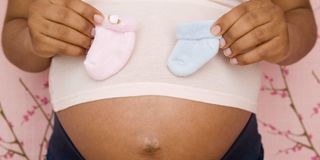It is possible but risky to conceive after 40

Mercy After age 35, fertility begins to reduce rapidly and at age 40, your chances of conceiving go down significantly PHOTOs/net
What you need to know:
At 40, chromosomal abnormalities are common in the poorer quality eggs that your ovaries release and this means that the chance of your baby having birth defects or even a chance of miscarriage is greater
Whether it is your first baby or you are trying to add another member of the family, conceiving after 40 is a common trend but is considered to be risky, according to Dr Herbert Kayiga, a gynaecologist at Case Hospital and lecturer at Makerere University. Studies show that women’s ovarian reserve goes down significantly after 37 years.
“After age 35, fertility begins to reduce rapidly and at age 40, your chances of conceiving go down significantly. Conceiving is not about the number of eggs but their quality. The quantity and the quality decline as a woman grows older because a woman is born with a certain number of eggs and the best quality eggs are used for ovulation each month,” says Dr Kayiga.
The age of the spouse also matters, Dr Kayiga says. “If he is older, conceiving may require advanced fertility treatments such as using intrauterine insemination (IUI) procedure, where the sperm is placed directly into the uterus using a small catheter to improve the chances of fertilisation.”
Dr Joseph Nsengiyumva, a gynaecologist at Bethany Hospital, advises women to normalise having their eggs harvested at an early stage in an egg preservation procedure that costs Shs5m.
“When a woman turns 30 and has no plans of conceiving in the near future, she can have her eggs harvested and preserved until a time she is ready to conceive. This helps to produce healthy babies that will not have chromosomal defects,” says Dr Nsengiyumva
He adds that the same procedure can be done for women diagnosed with cancer. “Their eggs can be harvested before they start on treatment, especially chemotherapy which affects fertility. Conception is easier after receiving their cancer treatment,” he explains.
Complications
At 40, chromosomal abnormalities are common in the poorer quality eggs that your ovaries release and this means that the chance of your baby having birth defects or even a chance of miscarriage is greater.
Women who conceive for their first time after 40 years usually develop fibroids and this increases the risk of having miscarriages or giving birth to prematures. “A mother who conceives after 40 is likely to develop high blood pressure causing preeclampsia which is one of the leading causes of death among pregnant women. The mother may also develop gestational diabetes,” Dr Nsengiyumva says.
Monitoring
Pregnancy comes with its own strain to the body and some joints and bones are already starting to lose mass after the age of 40. Dr Kayiga recommends that an expectant mother should be monitored closely for management of high blood pressure, gestational diabetes, ectopic pregnancy and sometimes a miscarriage. He adds that the monitoring helps watch out for birth defects, especially down syndrome.
Dr Frank Kyeyune, a gynaecologist at Case Hospital, urges mothers to seek antenatal services as soon as they conceive. “Like the other younger mother, a mother in her 40s will be given folic acid to help reduce the risk of having a child with neuro-defects. She is also supposed to feed on a balanced diet to support growth and development of the baby,” he says.
Smoking and alcohol consumption are prohibited during pregnancy. The mother should remain active to reduce the chances of developing clots. Such a mother needs to be monitored on a monthly routine and if any complication occurs, it should be dealt with immediately. From the close monitoring, the doctor can determine whether the mother will be able to deliver normally or will require a C-section.
Giving birth
According to Dr Kayiga, vaginal delivery is very possible at 40. However, it may also be challenging because the older you get, the higher the risks of birth injury to the baby and or the mother. Other medical conditions, such as preeclampsia may also make it safer to have a caesarean delivery.
Dr Nsengiyumva recommends a c-section for women after 40 because there may be a fibroid obstructing the pathway of the baby. “Individual assessment is usually done and a final decision about delivery is done by week 36,” he adds.
A mother who prefers to deliver normally will be given a chance but must come to the hospital because this is a precious baby. We usually choose a delivery option which will keep both the mother and baby safe,” he says.




